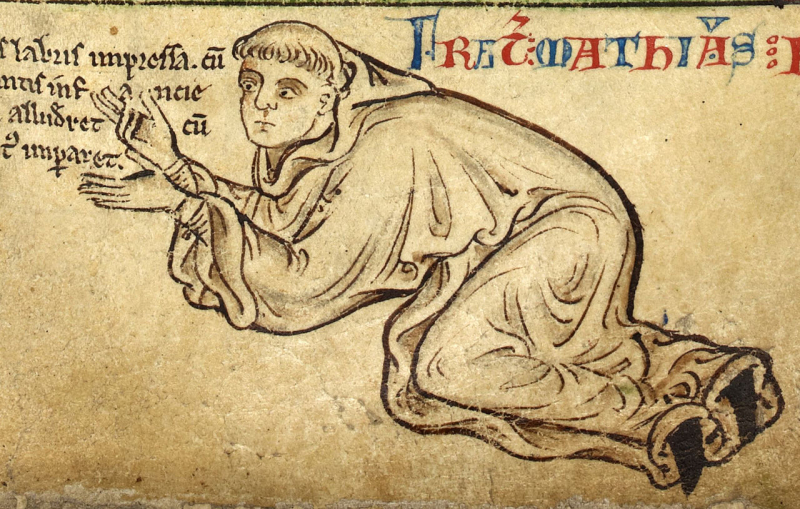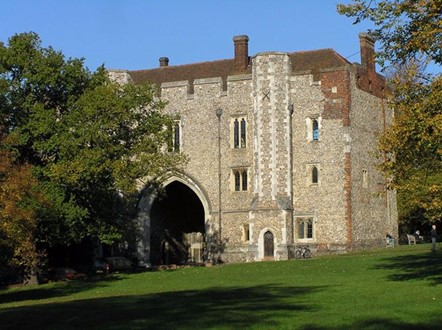Thomas Walsingham is best known for his role as a chronicler of his own religious life, but he was also privy to many of the events that took place in Parliament in the late 14th century. Simon Payling, from our Commons 1461-1504 project, explores what Walsingham’s writing can tell us of the medieval political landscape as well as his own feelings towards Parliament.
Ordained in 1364, Thomas Walsingham, the last of the great medieval monastic chroniclers, spent nearly his entire adult life as a monk in the great Benedictine abbey of St. Albans. His writings, the most important of which was his Chronica Maiora (now existing in a confusion of texts prepared at different times), show a man of forthright opinions who was readier to condemn than to praise. He lived through a dramatic and formative period in parliamentary history, and parliamentary affairs formed a recurring theme in his narrative. What he has to say is worthy of close notice, and, although he viewed all with a prejudiced eye, he was very well-informed. On one occasion, in respect of the Parliament of October 1385, he appears to have been a direct witness to parliamentary events, and on others he benefited from the testimony of both his abbot, who had a seat in the House of Lords, and the constant stream of important visitors a great abbey attracted.
Walsingham’s best-known and most vivid reference to Parliament concerns that of 1376, perhaps the most important assembly of the medieval period. His detailed account is notable in two respects: it bestowed the title of ‘good’ on the assembly, a description still used today, and, uniquely in respect of any account of a medieval Parliament, it provides a description of an MP’s dream. His informant was Sir Thomas Hoo, MP for Bedfordshire, who told the chronicler that, at the beginning of the assembly, he had dreamt that he saw seven gold florins on the floor of Westminster abbey’s chapter-house (which served as the Commons’ chamber). Anxious to find the owner of the seemingly-mislaid coins, he enquired among his fellow MPs and then ‘respectfully’ approached the monks. The most ‘eminent’ of the latter explained that they were not lost coins, rather they represented gifts bestowed on the Commons by the Holy Ghost, the gold signifying wisdom. Walsingham uses this story to show that the knights of the shire, in their opposition to the failing and corrupt regime of Edward III’s last years, ‘were prompted by the loving counsel of the Holy Spirit’.
It is this account, strong in its praise of the Commons, that is generally cited when the Chronica Maiora is mentioned in a parliamentary context. Yet it is entirely unrepresentative of the chronicler’s attitude to Parliament as a whole. This was almost unremittingly negative. In some cases, his disapproval was specific to an individual assembly: he deprecated the Parliament of 1377, in which the court-party, headed by John of Gaunt, undid the work of its much-admired predecessor. This, it could be argued, reflected his disapproval of the sudden change in the political climate rather than a negative view of the institution of Parliament itself. That unfavourable attitude was, however, to become apparent in his relentlessly critical commentary on the Parliaments from 1378 to 1410, culminating in his ringing condemnation of the Commons in this last assembly. Indeed, it is not going too far to say that he came to view the institution, and particularly the Commons, as an enemy of both the people and the Church.

From the Historia Anglorum
British Library Royal MS 14 C VII, f. 6r.
Walsingham’s critique was a comprehensive one. In his view, the Crown had sufficient resources not only to maintain the royal household and other ordinary charges, but also to wage war, if the ‘kingdom was governed sensibly and honestly’. Parliamentary taxation had no easy place in such a view, and he generally condemned its granting. He argued that the Commons, conspicuously not following the admirable precedent of 1376, failed in their duty by not effectively resisting what he saw the Crown’s needless and burdensome impositions. He was characteristically trenchant in his expression of these views. Of the Parliament of November 1384, he wrote that, ‘as had now been the case for many a year, nothing worth recording took place except that a document was produced for the extortion of taxes from the clergy and the common people for the financing of the useless wars of the king’. He was equally unimpressed by Parliament’s other main function, the making of legislation. Of the Cambridge Parliament of 1388, he wrote slightingly, ‘many … statutes were enacted there, details of which I omit here, mainly because these same statutes were often enacted in the past but completely disregarded’.
Alongside this negative commentary on parliamentary taxation and legislation ran a yet more outraged one on what he took to be the anticlericalism of a Commons too easily influenced by the religious ideas of John Wycliffe (for whom Walsingham had nothing but hatred and contempt). Two assemblies attracted his particularly robust denunciation. The first of these was that of October 1385, which he appears to have attended as his abbot’s proxy and in which the Commons sought to make their own grant of the taxation dependent upon a grant by the clergy. When, on Walsingham’s testimony, William Courtenay, archbishop of Canterbury, vigorously opposed this assault on the independence of the Church, the knights of the shire ‘furiously pleaded’ that churchmen should be punished for their arrogance by being deprived of their temporalities. Indeed, the ‘madness of the knights on this issue was so great that they actually believed that what they were asking for could be put into effect’ and ‘you could have seen them preening themselves, with one of them promising himself a certain sum from this monastery, and another a sum from another monastery’. He himself heard one of the knights swear that he would have 1,000 marks p.a. from the temporalities of St. Albans. The young Richard II attracted the chronicler’s praise for his decisive rejection of these ’unruly ravings’.
These ‘ravings’ were to raise their head again in the Parliament of 1410, and in a more considered and comprehensive form. That assembly heard the most radical proposal ever made by the medieval Commons, namely the confiscation of the temporalities of the Church to relieve the need for direct taxation and endow what amounted to a new landed class of 15 earls, 1,500 knights, 6,200 esquires and a hundred new almshouses. The figures were as risible as the proposal itself was in practical and political terms. Walsingham was characteristically forthright: ‘the parliamentary knights, or, to name them more truly, the ‘minions of Pilate’’ (‘milites parliamentales vel ut dicamus verius satellites Pilatales’) made the proposal ‘with no thought for the good of the kingdom but with malice in their hearts and no time for anything but this one crime’.
One must doubt how much support there was in the Commons for any scheme of clerical disendowment. Walsingham may have deliberately magnified the threat to emphasise the danger of the Lollard ideas that underpinned such proposals and so repelled him. None the less, his negative view of the Commons, leaving aside his account of the 1376 Parliament, is a consistent theme. In 1376 the Commons had been ‘prompted by the loving counsel of the Holy Spirit’; by 1410 they had become ‘minions of Pilate’.
S.P
Further Reading
A. Goodman, ‘Sir Thomas Hoo and the Parliament of 1376’, Bulletin of the Institute of Historical Reasearch, xli (1968), pp. 139-49.
The Chronica Maoira of Thomas Walsingham, 1376-1422, trans. D. Preest (Woodbridge, 2005)

